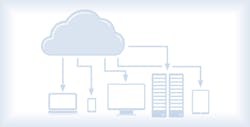The cloud: More affordable than you think
A new study says that less than 60 percent of physicians are using EHRs, and the smaller the practice the less likely they are to use an EHR. Smaller, independent practices have always been slower to adopt EHRs.1 And it’s no wonder when you consider what a client-server EHR can cost. But today, there are cloud-based EHRs that are so much more affordable. Cost shouldn’t be a factor in EHR selection anymore.
In fact, there are a lot of benefits that cloud-based EHRs offer that should be removing barriers for EHR adoption. And with the Merit-based Incentive Program (MIPS) coming in 2017, now is the time to consider an EHR to avoid potential penalties and position your practice for incentives, which could be as much as a 27 percent increase in Medicare reimbursement.
Here are some key advantages to cloud-based solutions:
- Cloud-based EHRs are much more affordable. This is worth mentioning again in some detail: Data suggests that for a five-doctor practice, a server-based EHR would cost $233,000 for the first year.2 Based on the average cost of cloud-based EHRs and the standard hardware needed, the same practice would spend around $5,000 to $10,000 in upfront costs for the first year. And if you include soft costs like reduced productivity, it is about $30,000 for the first year.
- There are often no contracts. Many cloud-based solutions are sold through a subscription with little or no upfront costs.
- You can stay up to date more easily with cloud-based software. Whether it is an EHR, billing system, or practice marketing solution, cloud-based software can be updated regularly at no cost. Companies can even push out live updates in real time during business hours with no interruption in service.
- There is no need to have an IT person on staff. Once you buy your hardware and set up your internet, you are good to go. There are no servers to maintain or updates to install. You don’t even have to do manual backups.
- Sign up and start training right away. You don’t need to wait for a complex installation and onsite training. Additionally, many vendors include free implementation and training as part of the package. Subscription-based services want to keep your business, and this is one way they can do that.
- Easier integration and interoperability. Many cloud-based solutions have open APIs that allow other companies to easily integrate with the software. This positions these companies to be better prepared for any interoperability mandates that may come in the future. Because of this and the ease of upgrades, these systems can also offer a broader depth of integrated options for your practice.
- Work from anywhere at any time. There is a unique flexibility that comes with a cloud-based solution, allowing you to complete tasks or reply to messages outside of the office, via mobile solutions, or while in between patient appointments.
Some people still express concerns about security and reliability when software is in the cloud, but cloud-based EHRs have an excellent track record of protecting data. Your patient data is just as secure on a cloud-based billing and EHR system as it would be in your practice on a server, and in many cases it is more secure.
Others are worried about potential downtime, asking: “What happens if the internet goes out?” or “Where does my data go if I close my practice?” A reputable healthcare IT company will have good answers to those questions, and you should ask. Other things you should ask include:
- Pricing, extra fees, and contracts. On top of asking technical questions related to the software, you should also consider the training, implementation, ongoing support, and upgrades. Then, ask about what hardware is needed and any other possible costs. You should be able to get a pretty good breakdown. It should be more affordable, but don’t assume. Do your homework.
- Who owns the data? Your data should be yours, and you should be able to get it out of the system when you want it or transfer your business to another vendor. Ask about this and what is involved. EHRs that are 2014 Edition Certified for Meaningful Use are required to be able to provide a CCDA file to transfer patient data from one EHR to another more easily.
- How is data protected? Ask about security and what happens in the event of data loss or corruption.
- What is the system downtime? You want a system that has very little downtime so you and your patients are not negatively impacted.
- How do you manage staffing changes? What do you do if someone leaves the company? How do you to prevent unlawful access to the system and protect your data?
- Are there native apps for small-format devices like the iPad? If you plan to access your system remotely, ask about how you access the software on different devices. Native apps are often more user friendly than logging into the system via the internet on a smaller device.
Generally speaking, most EHR vendors are updating their software to run in the cloud; so don’t get stuck with last year’s system. If cost and complexity have been the primary issues keeping you from moving ahead with an EHR or have prevented you from upgrading an old billing system, look at the cloud as a viable solution. It can help move your practice into the modern age without breaking the bank.
Once you move forward, you can open the door to new programs designed to increase revenue and improve patient care, including new payment models like Chronic Care Management, MIPS, and CPC+.
References



